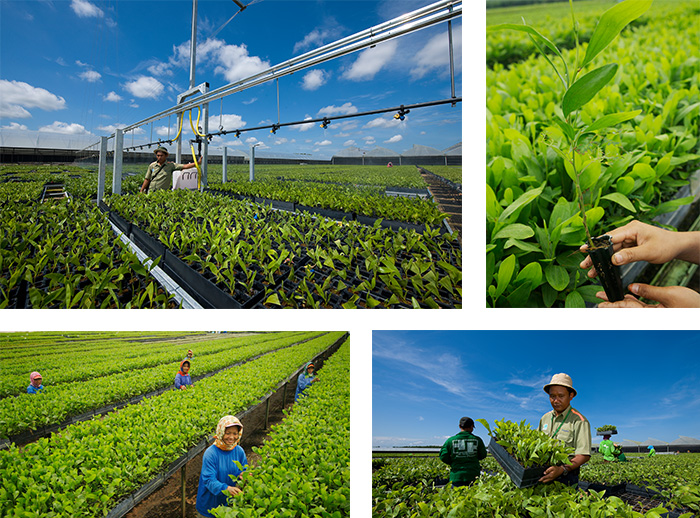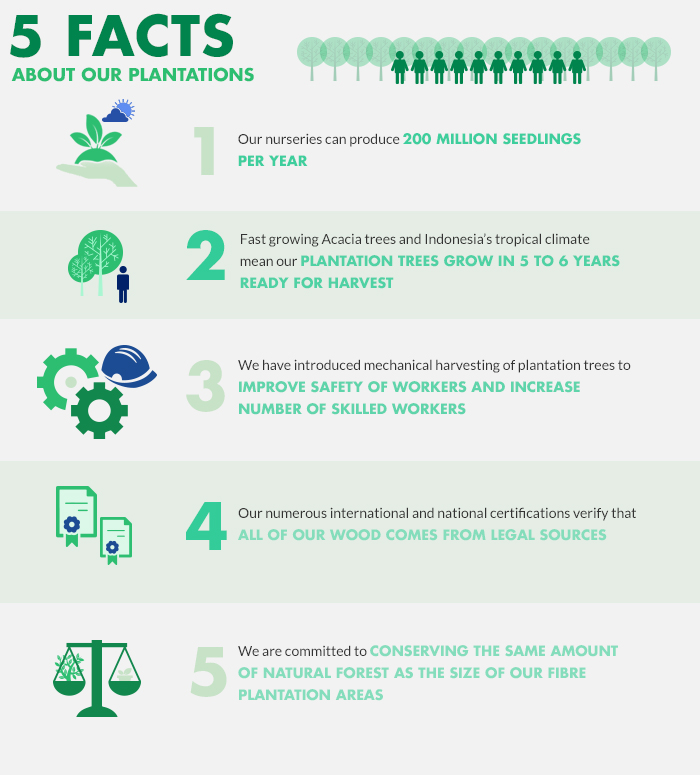Plantation Management
Plantation management is at the heart of APRIL Group’s business and operations, guided by our sustainable approach which focuses on environmental, social and economic development initiatives. Through our plantation management, we conserve high conservation value forests and support local economic development while planting millions of trees annually and harvesting the yield sustainably.
As part of the company’s landscape approach to managing its plantation areas, APRIL regularly holds public consultations with stakeholders to get external perspectives on the ongoing management of plantations and conservation and restoration areas, and to ensure continued alignment with existing laws and regulations on land governance. The indicators, which are used to measure APRIL’s progress against its sustainability commitments, were subject to stakeholder consultation with local and international stakeholders during the development process.
A Sustainable Approach
APRIL Group operates under a Sustainable Forest Management Policy (SFMP). The policy guides the management of 1 million hectares allocated to APRIL Group for forestry under government concession, of which approximately 450,000 hectares is set aside for sustainable plantation. This area includes third and fourth generation renewable plantations, first planted in 1993. The establishment of renewable plantation on this land was completed in 2014. The remaining areas in our concessions are set aside for mandatory protection, community use, infrastructure as well as areas voluntarily set aside for Conservation and Eco-Restoration.

We plant three main species to produce pulp and paper: fast-growing Acacia mangium, Eucalyptus and Acacia crassicarpa as well as hybrid species to cater to customer demands. Natural genetic improvement programmes are implemented to improve the yield of each species and enhance productivity.
APRIL Group employs over 9,000 plantation workers, with the number growing to 13,000 during harvesting periods. Working with our partners, we harvest between 80,000 to 90,000 hectares of plantation forest per year, working within government guidelines inside granted concession area.
These areas are rapidly replanted with over 200 million seedlings per year.
Protecting Conservation Areas
APRIL Group implements a ‘ring plantation’ method as a way to protect conservation forest from encroachment and degradation. Productive Acacia plantations are established on the periphery of our concessions, creating a buffer zone that helps to conserve the interior peat core of raised domes. Plantations deployed in this way make illegal logging and human encroachment less likely.
The plantation ring generates an economic return as well as the resources and employment opportunities to support the livelihood of local communities. The ring plantation approach achieves an important balance between renewable plantation, conservation and local economic development.
The ring plantation approach was developed in response to the challenges posed by unmanaged land, which is prone to encroachment and degradation through illegal logging or fire. This managed approach integrates plantation forest and conservation land as part of holistic landscape management that also includes fire prevention and hydrology management.
Land Cover Change Monitoring
APRIL monitors changes in forest land cover across an area of approximately one million hectares. This area is comprised of plantations and conservation and restoration concessions. Early, accurate and reliable detection of land cover change plays a critical role in the effective protection and management of conservation areas. APRIL’s commitment to monitor land cover change is independently externally verified by KPMG PRII, as part of the annual audit of the company’s progress against its SFMP 2,0 commitments.
The earlier deforestation activities can be detected, the earlier preventive actions can be implemented. A dedicated team of remote sensing analysts gather information and identify changes every 16 days using satellite data at a resolution of 30m x 30m. This effectively means that an experienced and skilled technician can identify deforestation activities down to a single large tree.
Once land cover change is identified and recorded, the next step is for a field team to assess and verify the situation on the ground. Natural forests are dynamic systems with new trees growing while older ones age and decay, so distinguishing forest cover change linked to encroachment and other illegal activity as opposed to the natural process is necessary.
The field team can locate the area using GPS and proceed to investigate it on-foot or via drones. They collect evidence on what caused the change and report back. If the land change is deemed to be caused by illegal forest clearance, local estate teams take immediate action, including lodging a report to police authorities, fencing off the area, and working to ensure that there is no additional damage. This work extends to all APRIL owned, long-term and open market suppliers.
Standards Required from Suppliers
APRIL Group sources additional fibre from third party supply partners who are required to comply with APRIL Group’s Sustainable Forest Management Policy. Strict standards are demanded from suppliers, who must be certified and complete regular chain of custody audits to ensure all wood is from legal sources and that they are in compliance and certified.
In addition, we maintain intensive dialogue with supply partners and discuss any supplier issues raised by external stakeholders with the supplier concerned, providing feedback and viewpoints and encouraging actions by supply partners to address any problems identified.
Community and Forestry
Sustainable forestry plays a key role in job creation, poverty alleviation and the improvement of health and education outcomes. We believe that growth and prosperity should be inclusive and benefit a wide range of stakeholders, achieved by putting in place the science and knowledge that generates economic, social and environmental benefits.
In an effort to contribute to local economic development, APRIL and supply partners implements outgrower programs such as livelihood plantation or Tanaman Kehidupan covering approximately 37,000 hectares and community tree farming of about 8,600 hectares (data as of December 2016).
Since 1996, APRIL Group has cooperated with local communities to build capability and foster the sustainable productivity of these areas. As well as this, APRIL Group also sets aside land from its concession for livelihood plantation. Livelihood plantation is used for a mix of rubber and Acacia tree plantation, with APRIL Group providing hands-on support to ensure it’s productive management, as well as vocational training and resources.

Find more on plantation management in our Sustainability Report .

